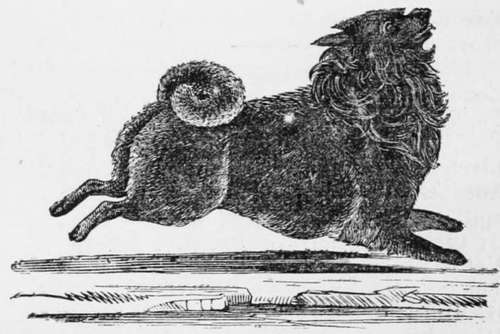Esquimaux Dog
Description
This section is from the book "Breeding, Training, Management, Diseases Of Dogs", by Francis Butler. Also available from Amazon: Breeding, training, management, diseases.
Esquimaux Dog
Pet of the Laplander and Esquimaux, Where dwarfish men and stunted mosses grow , Whore winter long extends his dreary reign, And ponderous icebergs choke the northern main.
Foxlike in shape, nor varies much in size, Short ear erect, sharp nose and cunning eyes ; Or black or white with coarse and lengthy hair ; Condensed by climate and by scanty fare ; Thick bushy tail, flat on his back and curled ; Tho' in the hour of peril, oft' unfurled ; Lively and active, vigilant and gay, Not lacking courage, anxious to obey ; Spitz, Pomeranian, Arctic, Esquimaux, By various epithets, the breed we know; Yet so peculiar is the genuine race, The least impurity his traits deface ; His compact form, thick set, robust and trim, His sprightly gait, black nose and supple limb, His dress unique, his dark inquiring eye, All base ignoble counterfeits defy. In German States, where men most need their wits,
Is most esteemed of all, the watchful Spitz ; A bribeless guard, not oft' with strangers free, There's many a hound,that well a Spitz might be of Hydrophobia, among an average stock of sixty or seventy dogs, under my own eye, nor a solitary case, among some twenty or thirty more, kept for me by others ; although I have had many, which, had they fallen under public notice, would no doubt have excited the usual and alarming echo of Mad dog 1 Mad dog!
A vacant, wild, sullen expression of the eye, movements to and fro, apparently without an object, a tendency in the animal to devour that, which he would at other times have left unnoticed ; unusual indications of affection, in which he persists, in spite of his master's commands : a marked uneasiness in all his movements ; a constant changing from place to place : a disposition to snap on the slightest approach of annoyance : a desire to retire from the presence of any one : an unwillingness to quit his retreat or to come at his master's call, licking his own urine. etc., these are symptoms of Hydrophobia. Yet all these may exist in different animals, and not one of them be bordering on madness, Nevertheless, there is after all, a certain something, in the appearance of an animal with the symptoms of Rabies, that should not be misunderstood by him, who has been accustomed to scan the ordinary movements of his favorite. The decided change which has taken place should not be carelessly disregarded, and when ever any suspicious indications present them selves, the animal should be securely chained or confined, where he may be out of the reach of everybody, until the case be clearly defined. I do not mean by this, that a suspected individual, who has already become the subject of a marked change of demeanor, should be even trusted with his master's lingers, but that he should be collared and chained in such a way, as to annihilate all risk of injury. The eye will generally denote the disposition; therefore where suspicion exists, and before the hand be extended to touch the animal, he should bo playfully spoken to by his master, who may gently and jocosely present him some object attached to the end of a long stick, which will be a fair way of testing his feelings.

Esquimaux Dog
He should be excited by his usual watch words, that he may afford an opportunity of noting his actions. His usual food and water should be cautiously placed within his reach ; in fine, every precaution should be observed.
Continue to:
